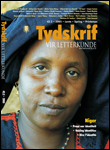Reflections on Islamic values and the use of Arabo-Islamic vocabulary in the Wakoki of Maazou Dan Alalo
DOI:
https://doi.org/10.4314/tvl.v42i2.29708Keywords:
Islam, Arabo-Islamic vocabulary, Hausa poetry, “Waka/ Wakoki” (Song), Zinder/Damagaram, Sultan of ZinderAbstract
This paper proposes to reflect on the islamisation of Hausa poetry using the example of the wakoki (songs) of Maazou Dan Alalo. Maazou. Born between 1906 and 1910, at Kiyauka, Katsina in today’s Nigeria, he died on 29 November 2002. Though not a griot by birth, he became the bard of the chief of his village and later court griot to the Sultan of Damagram (Zinder). Islam, introduced in African milieus and in their cultural expressions, generated new religious and linguistic elements, while also producing novelties in their artistic and literary creativity and productions. One example, in the case of Zinder and of Dan Alalo’s wakoki, is the annexation of Islamic virtues in the praise songs of chiefs in Islamised African societies, in which political and religious time came to overlap. Islam was pressed into service to legitimise political rulers like the sultan. However, the sociocultural and political role of the griot took on a particular hue under colonial rule. Public amusement, panegyric of the great and wealthy took place in the overcast conditions of colonial occupation. In this context, Dan Alalo’s wakoki allow a close-up view of colonial history as lived experience, complete with of a range of inside insights on social dynamics, including changes in the power pyramid, strategies of adaptation and preservation of the elite, of the community, and of people’s dignity in particular. In this enterprise, the griot played – and was aware of playing – an invaluable role: in social commentary, censure and distraction. His multiple functions included providing a sense of continuity, protecting the dignity of local rulers and of the community as a whole, through the catharsis of humour, in particular.
Downloads
References
Belinga, Eva. 1965. Littérature et musique populaires en Afrique noire. Paris: Cujas.
Buschinger, D. 2004. Figures du pouvoir, figures du roi dans l’épopée mandingue, Bainjala et Tristant D’Eihlar von Oberg. Figures du pouvoir et figures du roi dans l’épopée médiévale européenne et l’épopée africaine. Revue Médiévales 33: 3-7.
Dérive, Jean. 2004. Y a-t-il un style épique? Les Epoéees. Unité et diversité du genre, Paris: Karthala.
Dieng, B. 2003. Oralité et Création. L’Epopée et l’islamisation des traditions de l’Ouest africain. Ethiopiques 70: 99-117.
Dieng, S. 1991. Techniques littéraires des chansons de geste et des épopées peuls. Annales de la Faculté des Lettres et Sciences Humaines (Dakar) 21: 65-76.
Niang, Abdou Salam I. 1999. L’Expression de l’univers hausa dans les chants de Maazou Dan Alalo. Thèse de Doctorat de Troisième Cycle, FLASH, Université Cheikh Anta Diop de Dakar.
Nicolas, Guy. 1975. Dynamique et appréhension du monde au sein d’une société hausa, Paris: Institut d’Ethnologie.
Salifou, A. 1976. Le Damagram ou sultanat de Zinder au XIXe siècle. Centre National de Recherches en Sciences Humaines, 27. Niamey: CNRSH. Peyrouthel, Claude. 1994. Style et rhétorique. Paris: Nathan.
Zumthor, P. 1983. Introduction à la poésie orale. Paris: Seuil.
Downloads
Published
Issue
Section
License
Copyright (c) 2019 Tydskrif vir Letterkunde

This work is licensed under a Creative Commons Attribution-ShareAlike 4.0 International License.


 https://orcid.org/0000-0001-6465-6584
https://orcid.org/0000-0001-6465-6584


.png)